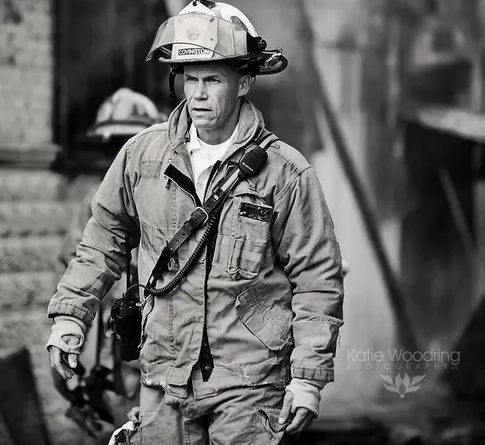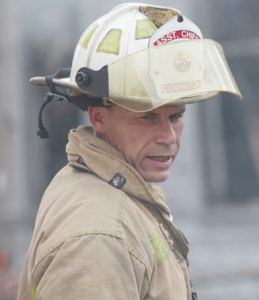When Assistant Chief Chip Terry retired in 2012 after 26 years with the Covington Fire Department, he addressed City leaders in a speech that recapped his career and detailed advances in the department’s efforts to protect the citizens of Covington.
Suddenly, his remarks turned personal.
Most people don’t realize the horrific and haunting tragedies that firefighters see, Terry said. Nor do they comprehend the psychological impact.

Photograph of Chip Terry by Katie Woodring Photography
“People don’t see at 3 in the morning when a young lieutenant has to put two toddlers and their grandmother in a body bag (or) a 16-year-old boy hangs himself with an electrical cord,” Terry told the City Commission. “How do you close your eyes at night after you make that run? I’ve seen people shoot themselves in the head. I’ve seen children beaten and burned.”
“…Today I can lay down in bed and close my eyes and still see the faces of those toddlers.”
In September 2017, family and friends say, Terry’s struggle with post-traumatic stress overwhelmed him to the point that he took his life.
“The more we see PTS cases like Chip’s, the more it comes to light,” Covington Fire Chief Mark Pierce said. “It’s the nature of the business we’re in. … After dealing with the things we deal with, you torture yourself with second-guessing.”
Pierce said he knew Terry since high school and worked with him for decades both as a firefighter and outside the department.
“Chip was a firefighter’s firefighter,” Pierce said. “No matter how high up in the rank structure he rose, he never forgot where he came from. He was respected by everybody from chiefs to the rank and file.”
Covington’s ongoing response
Shortly after Terry’s death, Covington created a Behavioral Health and Wellness Committee that began meeting regularly – every two weeks in the beginning – to focus on PTS, said Misty Haas, business analyst for the CFD.
The committee has brought together medical professionals, chaplains, retirees, family members, current firefighters, and fire administrators to boost awareness of post-traumatic stress, make it OK to talk about, call attention to resources, and reduce obstacles to accessing those resources, she said.
“Chip’s death was a catalyst, but we have other members who are struggling and dealing with their own issues in very unhealthy ways: alcoholism, apathy, thoughts or plans of suicide, etc.,” Haas said. “Unfortunately our biggest challenge is the culture: In fire-fighting as with the military, it has never been acceptable to show weakness. Promoting cultural change that allows for free and honest discussion was a must.”

Photograph by Katie Woodring Photography
To learn more information about it and Terry himself, or to donate to The Chip Terry Fund, whose 501(c) (3) tax-exempt status is pending with the IRS, click HERE.
City of Covington
























